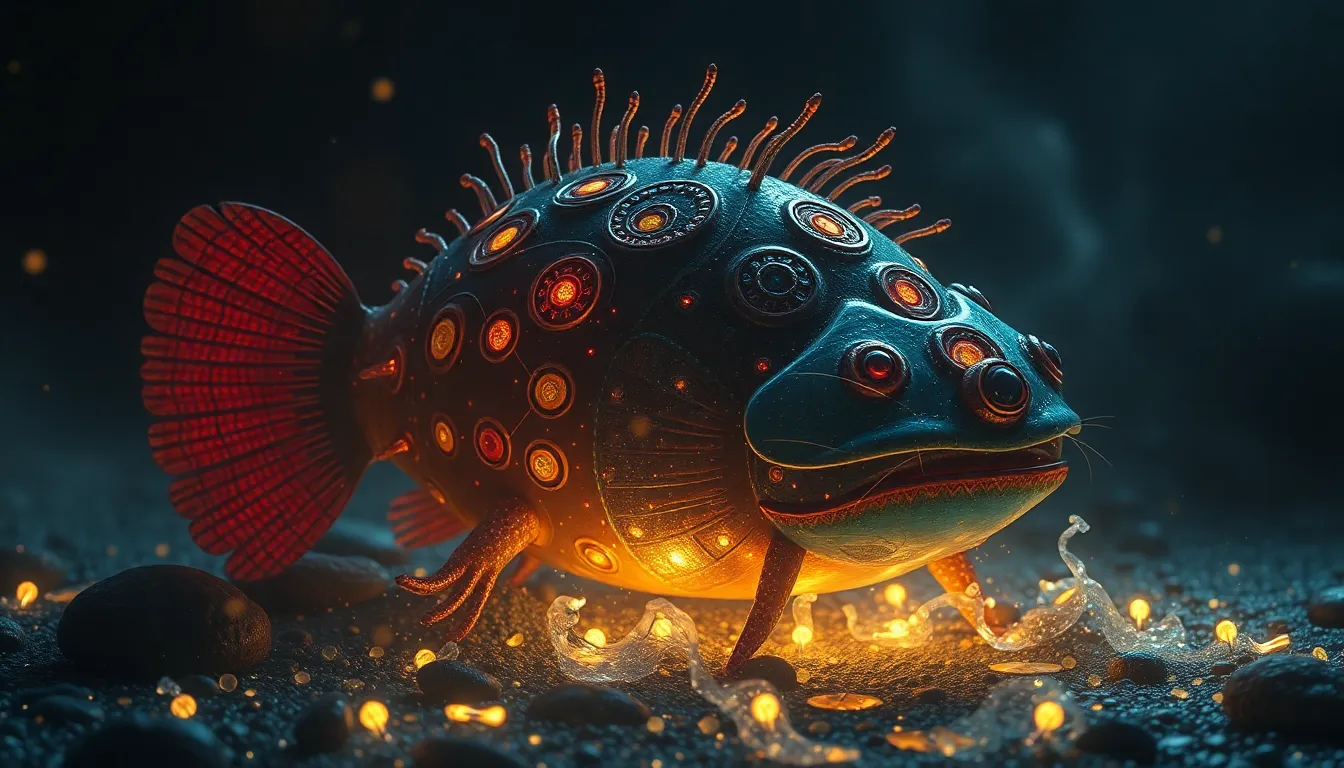The Sacred Pufferfish: Mystery and Magic in Folklore
I. Introduction
The pufferfish, known for its unique ability to inflate and its striking appearance, holds a special place in the natural world. Found in tropical and subtropical waters, these fascinating creatures are not only a marvel of biology but also a subject of intrigue in various cultural narratives. The importance of folklore cannot be overstated; it serves as a lens through which we can better understand the beliefs and values of different societies. This article aims to explore the sacred status of the pufferfish across cultures, revealing its multifaceted significance in folklore and tradition.
II. The Biological Wonders of the Pufferfish
Before delving into cultural perspectives, it is essential to appreciate the biological wonders of the pufferfish.
A. Unique physical characteristics
Pufferfish are recognized for their distinctive shape, often characterized by:
- Round, bulbous bodies
- Spiny skin that deters predators
- Bright colors that serve as warning signals
B. Defense mechanisms: The art of inflation
One of the most remarkable features of the pufferfish is its ability to inflate dramatically when threatened. This inflation serves as a defense mechanism, making the fish appear larger and less palatable to predators. The process involves:
- Swallowing water or air
- Expanding its elastic stomach
- Creating a formidable barrier with its spines
C. Toxicity and its implications in folklore
Pufferfish contain tetrodotoxin, a potent neurotoxin that can be lethal to humans. This toxicity has given rise to numerous myths and stories, influencing cultural attitudes towards the fish.
III. Historical Significance of the Pufferfish
A. Ancient uses in traditional medicine
Historically, various cultures have utilized the pufferfish in traditional medicine, believing it to have healing properties. Its use has been documented in:
- Ancient Chinese herbal remedies
- Traditional practices in Pacific Island nations
B. The pufferfish in ancient art and artifacts
Artifacts featuring pufferfish imagery have been discovered in archaeological sites, indicating their importance in ancient societies. These representations often symbolize:
- Protection
- Fertility
- The relationship between humans and the sea
C. Symbolism in early maritime cultures
Maritime cultures viewed the pufferfish as a symbol of resilience and adaptability, reflecting the challenges faced by communities dependent on the ocean.
IV. Pufferfish in Asian Folklore
A. The role of the pufferfish in Japanese culture
In Japan, the pufferfish, known as fugu, holds a unique place in culinary tradition and mythology.
1. Fugu and culinary traditions
Fugu is a delicacy that requires careful preparation to avoid poisoning. The meticulous art of serving fugu is steeped in:
- Skill and expertise
- Ritualistic practices
2. Spiritual significance and myths
Mythologically, the pufferfish is associated with various deities and is often seen as a guardian of the sea, embodying the spirit of transformation.
B. Chinese mythology and the pufferfish
1. Symbol of prosperity and protection
In China, the pufferfish is a symbol of prosperity, often featured in artworks and decorations. It is believed to attract good fortune and ward off evil spirits.
2. Folktales featuring the pufferfish
Many Chinese folktales depict the pufferfish as a wise creature, imparting lessons about resilience and respect for nature.
V. The Pufferfish in African Traditions
A. Spiritual beliefs surrounding the pufferfish in coastal communities
In various African coastal communities, the pufferfish is revered for its mystical attributes and is often incorporated into local spirituality.
B. The significance of pufferfish in rituals and ceremonies
Pufferfish are frequently used in rituals aimed at ensuring safe voyages and bountiful catches, symbolizing a connection between humans and the ocean.
C. Folkloric tales from West Africa
West African folklore includes numerous stories that highlight the pufferfish’s role in the ecosystem and its importance in maintaining balance within marine life.
VI. Pufferfish in Caribbean Lore
A. The sacredness of the pufferfish in indigenous cultures
Indigenous Caribbean cultures regard the pufferfish as a sacred creature, integral to their belief systems and spiritual practices.
B. Connection to marine deities and spirits
The pufferfish is often linked to marine deities, believed to embody the spirits of the sea, providing guidance and protection to fishermen.
C. Legends of transformation and magic
Caribbean legends often feature the pufferfish in tales of transformation, where it acts as a guide for those seeking enlightenment or wisdom.
VII. The Pufferfish in Modern Popular Culture
A. Representation in literature and film
The pufferfish has made its mark in modern literature and film, often symbolizing danger and intrigue, as well as the mysteries of the ocean.
B. Influence on art and fashion
Artists and designers draw inspiration from the pufferfish’s unique shapes and textures, incorporating them into various forms of contemporary art and fashion.
C. The pufferfish as a symbol of environmental awareness
In recent years, the pufferfish has emerged as a symbol of environmental awareness, representing the fragility of marine ecosystems and the need for conservation.
VIII. Conservation and the Future of the Pufferfish
A. Threats to pufferfish populations
Pufferfish populations face numerous threats, including overfishing, habitat destruction, and climate change, making conservation efforts crucial.
B. The role of folklore in conservation efforts
Folklore can play a vital role in conservation, as traditional stories often emphasize respect for nature and the interconnectedness of all living things.
C. Bridging traditional knowledge with modern science
Integrating traditional ecological knowledge with modern scientific practices can enhance conservation strategies and promote sustainable interactions with marine environments.
IX. The Interplay of Myth and Reality
A. How folklore shapes perceptions of the pufferfish
Folklore significantly shapes public perceptions of the pufferfish, often blending facts with myths that influence attitudes towards these creatures.
B. The impact of myths on scientific understanding
Myths surrounding the pufferfish can both enrich and complicate scientific understanding, as they sometimes conflict with empirical evidence.
C. Balancing tradition with contemporary ecological concerns
Finding a balance between traditional beliefs and modern ecological concerns is essential for promoting sustainable practices and preserving cultural heritage.
X. Conclusion
In summary, the pufferfish holds a profound cultural significance across various societies, embodying mystery, magic, and deep-rooted beliefs. The continuing relevance of folklore reminds us of our interconnectedness with nature and the importance of preserving both cultural traditions and the environments that inspire them. As we navigate the challenges of modern life, we must call to action for the preservation of the pufferfish and the rich tapestry of folklore that surrounds it.




